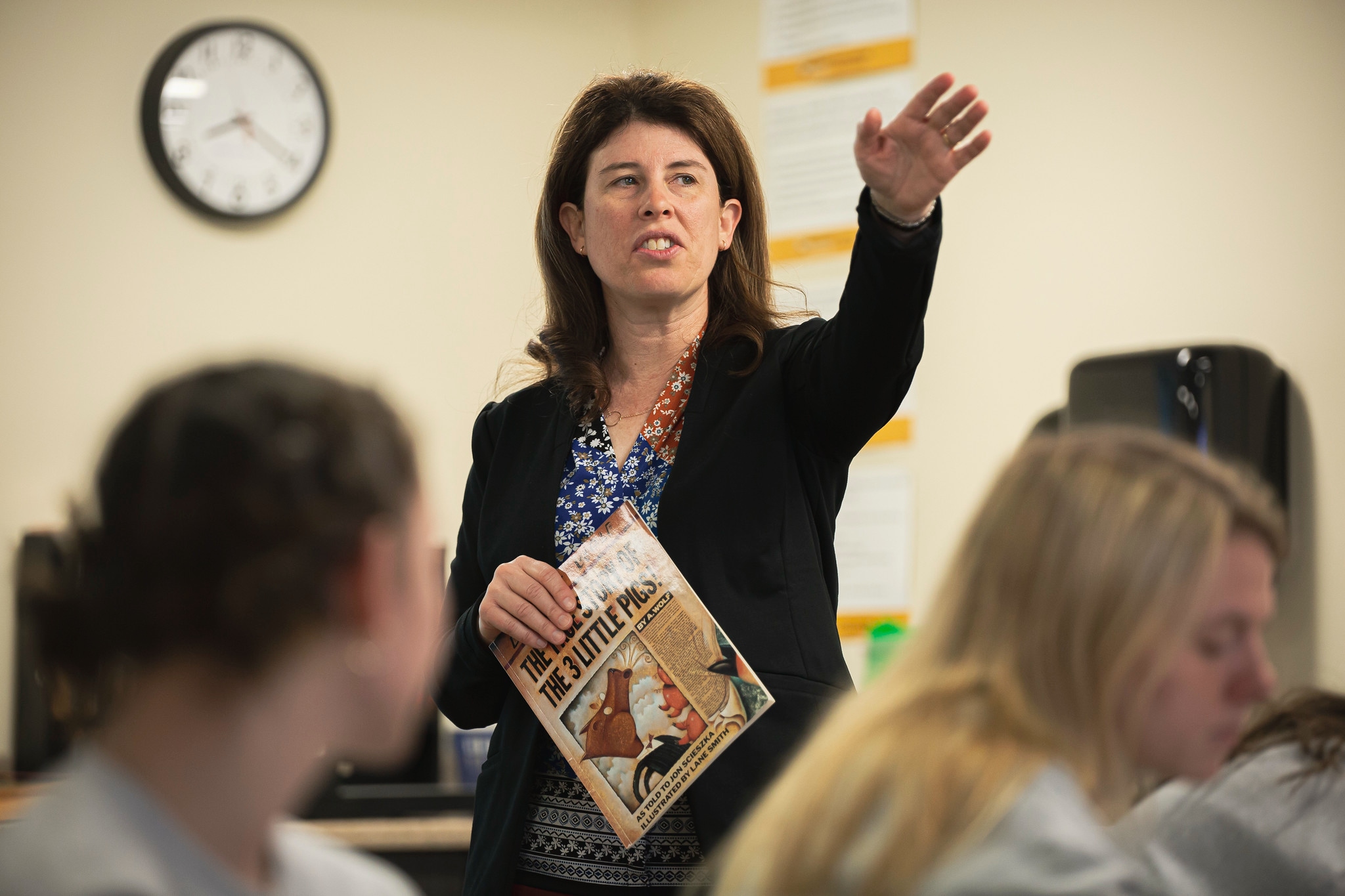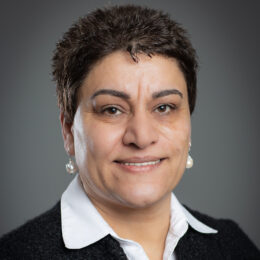Elementary Education: Mild Intervention
Earn your bachelor’s degree in early childhood education with a focus on Mild Intervention. Manchester University prepares you to teach in K–6 classrooms while supporting students with learning or behavioral exceptionalities through specialized training, inclusive strategies, and hands-on teaching experiences.

Support Diverse Learners with a Bachelor’s Degree in Early Childhood Education: Mild Intervention
Manchester University’s Elementary Education: Mild Intervention program equips you to meet the unique needs of students with learning and behavioral differences in inclusive K–6 classrooms. Designed for students pursuing a bachelor’s degree in early childhood education, this licensure track blends foundational teaching courses with specialized training in mild disabilities. The program leads to dual licensure in elementary education and special education, preparing you to develop individualized education plans (IEPs), apply effective classroom strategies, and support academic success for diverse learners. With a strong emphasis on field experience and mentorship, you’ll be ready to make a meaningful difference in today’s elementary schools.
Program Information:
- 120 Credit Hours
Location
- North Manchester
Why Choose MU for an Elementary Education Degree?

Dual Licensure Advantage
Field Experience from Year One
CAEP-Accredited, State-Approved Program
What You Can Do With Your Bachelor’s Degree in Early Childhood Education
Elementary School Teacher
Teach core subjects to children in inclusive K–6 classroom environments.
Special Education Teacher
Support students with mild disabilities using individualized teaching strategies.
Intervention Specialist
Design and implement learning plans that address specific student needs.
Resource Room Educator
Provide targeted academic assistance to students in small group settings.

Average Starting Salary for Elementary Education: Mild Intervention Degree Holders
Graduates with a bachelor’s degree in early childhood education focused on mild intervention typically earn starting salaries between $45,000 and $60,000, depending on location and school district. According to the U.S. Bureau of Labor Statistics, the median annual wage for special education teachers in elementary schools was $63,000 as of May 2024. Educators with dual licensure in elementary education and special education are often in high demand and may qualify for additional stipends or hiring incentives offered by many school districts.

How the Elementary Education: Mild Intervention Program Supports Your Growth
Early and Ongoing Classroom Experience
Specialized Training in Mild Intervention
Student Teaching and Practicum Experience
Accreditation and Licensure Alignment
Student Groups and Professional Involvement
Meet the Faculty
You Might Also Be Interested In These Programs

Frequently Asked Questions About the Elementary Education: Mild Intervention Degree
What is the focus of the Elementary Education: Mild Intervention program?
Manchester University’s Elementary Education: Mild Intervention program is designed for students who want to make a difference in the lives of children by supporting both general learners and those with mild disabilities in inclusive K–6 settings. This bachelor’s degree in early childhood education offers a dual licensure pathway, allowing graduates to teach in both elementary education and special education environments.
The program focuses on teaching foundational concepts in early childhood education, child development, and inclusive instructional practices. Students gain experience in individualized education plan (IEP) creation, classroom management, and differentiated teaching strategies. This ensures they are well-prepared to support academic success in a variety of early childhood settings, including public schools and inclusive classrooms.
Through a combination of general education courses, major courses, and specialized training in mild intervention, students learn to assess student needs, plan effective lessons, and adapt instruction to meet diverse learning goals. Emphasis is also placed on field experience, giving students exposure to early childhood classrooms from the beginning of the program.
This early childhood education bachelor’s degree is ideal for those committed to providing quality education for all students and pursuing a rewarding career in the teaching profession.
Will I earn a teaching license through this program?
Yes. Graduates of Manchester’s Elementary Education: Mild Intervention program are fully prepared to earn initial teacher licensure in two areas: K–6 elementary education and P–12 special education (mild intervention). This dual licensure enhances job opportunities across public schools and early childhood programs, as many districts seek versatile educators trained in both general and special education.
This bachelor’s degree in early childhood education includes all required courses for licensure, including coursework in child development, classroom management, and instructional planning. In addition, students participate in a full semester of student teaching in both general and special education classrooms. This field experience is a critical part of the teacher education process and helps students meet the standards required for licensure in Indiana.
By the end of the degree program, students are not only eligible to obtain licensure but are also well-equipped to lead inclusive classrooms, develop IEPs, and support children with diverse learning needs. Whether your goal is to teach in early childhood settings or pursue advanced study in professional studies or special education, this program offers the strong educational foundation needed to succeed.
What kind of field experiences are included in the program?
Field experience is a cornerstone of Manchester University’s Elementary Education: Mild Intervention program. Students pursuing this bachelor’s degree in early childhood education begin classroom-based experiences as early as their first year, allowing them to apply what they learn in real-world early childhood settings.
Students complete observations, tutoring assignments, and practicum work across rural, urban, and suburban school environments. These hands-on experiences allow future educators to develop skills in child development, classroom management, and differentiated instruction. By working alongside licensed teachers, students learn to manage classroom behavior, assess student progress, and adapt lessons to support children with mild disabilities.
A major component of the degree program is the full-time student teaching placement, which occurs during the final semester. Students are placed in both elementary education and special education classrooms, where they practice teaching young children with and without learning challenges. During this time, students create and implement individualized education plans (IEPs), gaining confidence and mastery in inclusive teaching strategies.
These field experiences not only support the program curriculum but also help students complete licensure requirements and prepare for a rewarding career as early childhood educators in today’s diverse classrooms.
How does the program prepare me for working with students with special needs?
Manchester’s Elementary Education: Mild Intervention program prepares students to support children with mild learning, emotional, or behavioral challenges by equipping them with a blend of theoretical knowledge and practical skills. As part of this bachelor’s degree in early childhood education, students take specialized courses in special education, educational psychology, literacy development, and classroom management.
The program emphasizes inclusive teaching strategies and individualized instructional planning. Students learn to write and implement IEPs, use behavior management techniques, and apply evidence-based practices to improve learning outcomes for all children. Emphasis is placed on developing critical thinking skills and instructional strategies that promote student engagement and success.
Field placements in early childhood education classrooms allow students to work directly with children receiving mild intervention services. These placements reinforce classroom knowledge and help students develop confidence in teaching young children with diverse learning needs.
Graduates of this degree program are well-positioned for teacher certification in special education and are prepared to provide quality education in early childhood settings. Whether working in public schools or private programs, graduates are ready to provide guidance, advocate for inclusive practices, and support academic growth in all students.
Are there career advantages to earning dual licensure?
Absolutely. Earning dual licensure in elementary education and special education significantly enhances your job opportunities and marketability. Many school districts seek professionals who can teach in both general education and early childhood special education settings. This bachelor’s degree in early childhood education prepares graduates for versatile roles in public schools, early intervention programs, and inclusive classrooms.
Graduates may serve as elementary school teachers, special education teachers, or intervention specialists. Some may also work in early childhood programs that emphasize inclusive practices or support services. Because of the dual licensure, graduates are often eligible for higher starting salaries, hiring bonuses, or additional stipends, especially in underserved districts.
This degree program also lays the foundation for graduate studies in fields like special education, human development, or behavioral science. Students who complete the program can pursue a rewarding career that supports children’s educational and developmental needs from early childhood through elementary school.
By combining strong academic training with meaningful fieldwork, Manchester University ensures its accepted students are well-prepared to meet licensure requirements, support student learning, and lead with compassion and expertise in the teaching profession.
Can I start this early childhood education program with previous coursework or an associate’s degree?
Yes. Manchester University welcomes students with previous coursework or an associate’s degree—especially from a community college—as they transition into the Elementary Education: Mild Intervention program. While this degree is not currently an online program, it offers flexible transfer pathways for accepted students who meet program-specific admission requirements.
If you’ve completed general education courses or foundational studies in early childhood development or educational psychology at a community college, some credits may apply toward Manchester’s bachelor’s degree in early childhood education. The admissions process includes transcript evaluation to determine how previously completed prerequisite courses align with the degree program.
Students interested in transferring should plan to meet with the program director and an admissions counselor to review transfer eligibility and remaining required courses. Manchester provides personalized advising to ensure that your transition into the program is smooth and efficient.
This early childhood education program provides a strong foundation in both elementary and special education, making it a great next step after earning an associate’s degree. With appropriate planning, transfer students can enter upper-division coursework and complete the program in a timely manner—paving the way toward teacher certification and a rewarding career in early childhood education.
Does Manchester University offer financial aid for this degree program?
Yes. Manchester University offers financial aid to students enrolled in the Elementary Education: Mild Intervention program, which leads to a bachelor’s degree in early childhood education. Whether you’re starting directly from high school, transferring from a community college, or pursuing a second science degree, there are multiple financial aid options to support your journey toward teaching certification.
Eligible students may receive scholarships, grants, or federal student loans. Financial aid packages are determined based on factors such as test scores, FAFSA submission, and overall academic performance. Students can also explore need-based aid, merit awards, and special scholarships for future educators or those entering teacher education pathways.
Manchester’s Office of Financial Aid works closely with each student to help navigate the admissions process, estimate tuition costs, and use available online tools to calculate award eligibility. Even if you’ve completed previous coursework or an associate’s degree, you may still qualify for assistance toward your early childhood education bachelor’s.
Fall admission is the most common entry point for this degree program. Accepted students are encouraged to apply for financial aid early and connect with advisors to make the most of available funding opportunities. With proper planning, you can reduce financial barriers and focus on becoming an impactful early childhood educator.
Elementary Education: Mild Intervention Learning Outcomes
Program Learning Outcomes
The mission statement of the Manchester University Department of Education is to bridge theory and practice, preparing students for professional careers that promote individual well-being, community engagement, and social justice.
Learning Goals: Graduates of our program will
- bridge theory and practice by applying their knowledge and skills in semester long internships or student teaching placements
- assess learning and development or the effectiveness of organizational programs designed for children, adolescents, and/or adults
- establish professional and reciprocal relationships with others invested in the emotional, physical, and cognitive well-being of others with whom they work
- create positive and caring environments for the development and academic progress of children, adolescents, and/or adults
- reflect on their role in the field of education as a means for bringing about social justice
InTASC Standards
1. Learner Development
The teacher understands how learners grow and develop, recognizing that patterns of learning and development vary individually within and across the cognitive, linguistic, social, emotional, and physical areas, and designs and implements developmentally appropriate and challenging learning experiences.
2. Learning Differences
The teacher uses understanding of individual differences and diverse cultures and communities to ensure inclusive learning environments that enable each learner to meet high standards.
3. Learning Environments
The teacher works with others to create environments that support individual and collaborative learning, and that encourage positive social interaction, active engagement in learning, and self-motivation.
4. Content Knowledge
The teacher understands the central concepts, tools of inquiry, and structures of the discipline(s) he or she teaches and creates learning experiences that make the discipline accessible and meaningful for learners to assure mastery of the content.
5. Application of Content
The teacher understands how to connect concepts and use differing perspectives to engage learners in critical thinking, creativity, and collaborative problem solving related to authentic local and global issues.
6. Assessment
The teacher understands and uses multiple methods of assessment to engage learners in their own growth, to monitor learner progress, and to guide the teacher’s and learner’s decision making.
7. Planning for Instruction
The teacher plans instruction that supports every student in meeting rigorous learning goals by drawing upon knowledge of content areas, curriculum, cross-disciplinary skills, and pedagogy, as well as knowledge of learners and the community context.
8. Instructional Strategies
The teacher understands and uses a variety of instructional strategies to encourage learners to develop deep understanding of content areas and their connections, and to build skills to apply knowledge in meaninful ways.
9. Professional Learning and Ethical Practice
The teacher engages in ongoing professional learning and uses evidence to continually evaluate his/her practice, particularly the effects of his/her choices and actions on others (learners, families, other professionals, and the community), and adapts practice to meet the needs of each learner.
10. Leadership and Collaboration
The teachers seeks appropriate leadership roles and opportunities to take responsibility for student learning, to collaborate with learners, families, colleagues, other school professionals, and community members to ensure learner growth, and to advance the profession.
Non-Discrimination in the Admission Process
Manchester University is committed to non-discrimination in campus life. The University does not discriminate on the basis of national origin, ancestry, race, color, age, sex, gender identity or expression, sexual orientation, familial status, religion, disability or veteran status in admissions or any area of campus life, including its educational programs, scholarships and loan awards, residence life programs, athletic programs, extracurricular programs, promotion and tenure policies and practice, and alumni affairs.
Manchester University is committed to carry out the provisions of Section 504 of the Rehabilitation Act of 1973 and the Americans With Disabilities Act, which provide for accessibility of University programs to the physically disabled.








